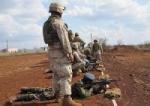WASHINGTON (AP) - Sapped by nearly six years of war, the Army has nearly exhausted its fighting force and its options if the Bush administration decides to extend the Iraq buildup beyond next spring.
The Army's 38 available combat units are deployed, just returning home or already tapped to go to Iraq, Afghanistan or elsewhere, leaving no fresh troops to replace five extra brigades that President Bush sent to Baghdad this year, according to interviews and military documents reviewed by The Associated Press.
That presents the Pentagon with several painful choices if the U.S. wants to maintain higher troop levels beyond the spring of 2008:
_Using National Guard units on an accelerated schedule.
Breaking the military's pledge to keep soldiers in Iraq for no longer than 15 months.
_Breaching a commitment to give soldiers a full year at home before sending them back to war.
For a war-fatigued nation and a Congress bent on bringing troops home, none of those is desirable.
In Iraq, there are 18 Army brigades, each with about 3,500 soldiers. At least 13 more brigades are scheduled to rotate in. Two others are in Afghanistan and two additional ones are set to rotate in there. Also, several other brigades either are set for a future deployment or are scattered around the globe.
The few units that are not at war, in transformation or in their 12-months home time already are penciled in for deployments later in 2008 or into 2009. Shifting them would create problems in the long-term schedule.
Most Army brigades have completed two or three tours in Iraq or Afghanistan; some assignments have lasted as long as 15 months. The 2nd Brigade, 10th Mountain Division, has done four tours.
Two Marine regiments - each roughly the same size as an Army brigade - also in Iraq,- bringing the total number of brigades in the country to 20.
When asked what units will fill the void in the coming spring if any need to be replaced, officials give a grim shake of the head, shrug of the shoulders or a palms-up, empty-handed gesture.
"The demand for our forces exceeds the sustainable supply," the Army chief of staff, Gen. George Casey, said last week. "Right now we have in place deployment and mobilization policies that allow us to meet the current demands. If the demands don't go down over time, it will become increasingly difficult for us to provide the trained and ready forces" for other missions.
Casey said he would not be comfortable extending troops beyond their 15-month deployments. But other military officials acknowledge privately that option is on the table ...







Bookmarks